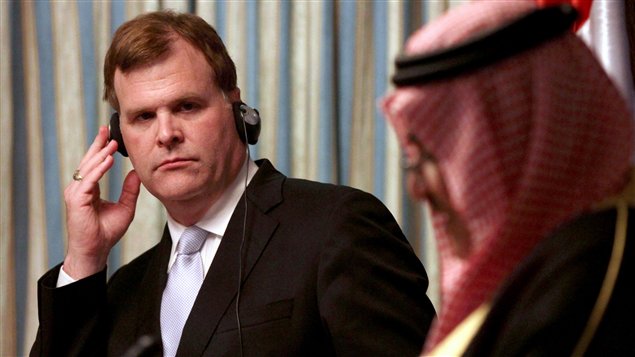Canadian Foreign Affairs Minister John Baird is touring several countries in the Middle East. He has repaired some damaged relations with the United Arab Emirates along the way and hopes to improve trade and relations with several countries.
“The trip is a good idea. It’s a very important region, much more important than we sometimes realize,” said Paul Heinbecker, former Canadian ambassador to the UN, currently with the Centre for International Governance Innovation and Waterloo University.
Economically, the trip is important says Heinbecker. He notes Canada is negotiating a free trade agreement with India, but it actually has as much or more trade in the Gulf region. “There is a large amount of foreign investment being generated in the Gulf towards Canada and elsewhere and it’s very important that we sort of get our share of that.”
“The second reason why it (the trip) is important is that it’s very valuable for the foreign minister to go and see with his own eyes what’s going on,” holds Heinbecker. “He has to understand that region and he has to create relationships with his counterparts and others in that region because it’s a strategically important region.”

The former ambassador notes that Syria is “imploding” and could end up disintegrating into ethnic enclaves. That could spread to Iraq which is in a precarious state. “So you have there a tremendous destabilization taking place.” Added to the mix is Iran, its role in the Syrian conflict and its tension with Israel, tension between Iran and the U.S. and the possibility of military action. Heinbeckers thinks it important for Canada’s minister of foreign affairs to have a personal appreciation of this dynamic and that he develop sources he can rely on to appraise the situation when he is back in Canada.
Accomplishments so far
-Baird visited with the king of Jordan, undoubtedly spoke about Syria, and announced a grant of $13 million to help Jordan with the influx of Syrian refugees.
-Baird smoothed over relations with the United Arab Emirates which had deteriorated dramatically after Canada refused its airline more landing rights. This, Heinbecker said, was done in a particularly ham-handed fashion and was no way to thank a country which had allowed Canada to use a military base there during its mission in Afghanistan and which had used its own state airline to transport wounded Canadian soldiers. Baird was able to remove a visa requirement for Canadians travelling to the UAE and the two countries will also create a joint business council.
– “We’ve opened a diplomatic office in Iraq. That’s an important step forward that will give us eyes and ears on the ground and our own voice with the Iraqi authorities,” says Heinbecker. “It also is a kind of launching pad for developing closer relations with the Kurdish area in northern Iraq where there’s a lot of oil field development taking place and where there’s a lot of Canadian economic interest at stake.”
-Baird announced that Canada will have an ambassador to the Organisation of the Islamic Conference, an organisation based on religion but political in nature. This, Heinbecker, says will give Canada some insight that it didn’t have before.
Goals for the rest of the tour
-Baird’s visit to Qatar will be important, thinks Heinbecker, because that country is supporting insurgents in Syria, so the visit will give him some understanding of “who is doing what there.”
-A visit to Bahrain will give Baird some insight into the Shia oppression of the country’s Sunni majority, information that will be valuable should conflict break out involving Iran and a possible spread of unrest to other countries.
-The visit to Cyprus will offer insight into the financial crisis and business opportunities in gas and oil in the eastern Mediterranean.
-Heinbecker wishes the minister would have an opportunity to speak with the director of the film documentary, The Gatekeepers in which six former heads of the Israeli secret service, Shin Bet, explain the need for a two-state solution between Israel and the Palestinians. The current Canadian government has a particularly strong pro-Israel policy.
Canadians don’t know enough
Heinbecker laments the fact that Canadians know little about Canada’s role in the Middle East. He notes that declining revenues mean many media outlets have closed their foreign bureaus so less information is available to the public. This, he says, makes the role of Canadian diplomats in the region all the more important.
RCI’s Lynn Desjardins speaks with Paul Heinbecker, former Canadian ambassador to the UN, currently with the Centre for International Governance Innovation and Waterloo University.
Listen






For reasons beyond our control, and for an undetermined period of time, our comment section is now closed. However, our social networks remain open to your contributions.